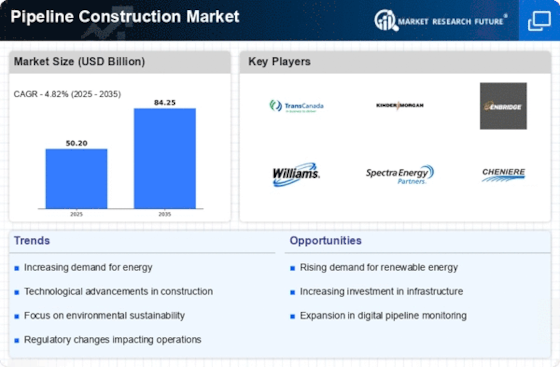Market Trends
Key Emerging Trends in the Pipeline Construction Market
The Pipeline Construction market is experiencing significant trends shaped by factors such as technological advancements, regulatory changes, and the evolving energy landscape. Expansion of Natural Gas Infrastructure: A key trend in the Pipeline Construction market is the ongoing expansion of natural gas infrastructure. The increasing demand for cleaner energy sources has led to the development of new natural gas pipelines to transport gas from production sites to distribution centers and end-users. This trend is particularly pronounced in regions transitioning to natural gas as a primary energy source. Focus on Renewable Energy Pipelines: As the renewable energy sector continues to grow, there is a notable trend towards the construction of pipelines for the transportation of renewable fuels. Pipelines for transporting hydrogen, biofuels, and other green energy sources are gaining attention as the world shifts towards a more sustainable and low-carbon energy mix. Technological Advancements in Pipeline Monitoring: Technology is playing a crucial role in the evolution of the Pipeline Construction market. Advanced monitoring and control systems, including the integration of sensors, drones, and artificial intelligence, are enhancing the safety and efficiency of pipeline operations. Real-time monitoring allows for early detection of potential issues, reducing the risk of accidents and ensuring regulatory compliance. Stringent Environmental and Safety Regulations: The market is influenced by increasingly stringent environmental and safety regulations governing pipeline construction. Governments and regulatory bodies are imposing strict standards to minimize the environmental impact of pipeline projects and enhance safety measures. Pipeline construction companies are adapting to these regulations by incorporating advanced technologies and environmentally friendly practices. Shift towards Modular Construction Techniques: Modular construction techniques are gaining prominence in the Pipeline Construction market. Prefabricated modules, constructed off-site and then assembled on-site, offer advantages such as cost efficiency, faster construction timelines, and reduced environmental impact. This trend aligns with the industry's efforts to optimize project timelines and costs. Global Expansion of Oil and Gas Exploration: The global expansion of oil and gas exploration activities is driving the demand for new pipeline construction projects. Emerging markets with significant oil and gas reserves are witnessing increased investments in pipeline infrastructure to facilitate the transportation of hydrocarbons. This expansion is reshaping the global landscape of the Pipeline Construction market. Investments in Pipeline Rehabilitation and Maintenance: In addition to new construction projects, there is a growing focus on the rehabilitation and maintenance of existing pipelines. Aging infrastructure requires upgrades and repairs to ensure continued safe and efficient operation. As a result, pipeline construction companies are diversifying their services to include maintenance, repair, and rehabilitation projects. Adoption of Sustainable Construction Practices: Sustainability is becoming a key consideration in pipeline construction. Companies are adopting sustainable practices, including the use of eco-friendly materials, minimizing environmental disturbances during construction, and implementing measures to reduce the carbon footprint of pipeline projects. This trend reflects the industry's commitment to responsible and sustainable infrastructure development.


















Leave a Comment